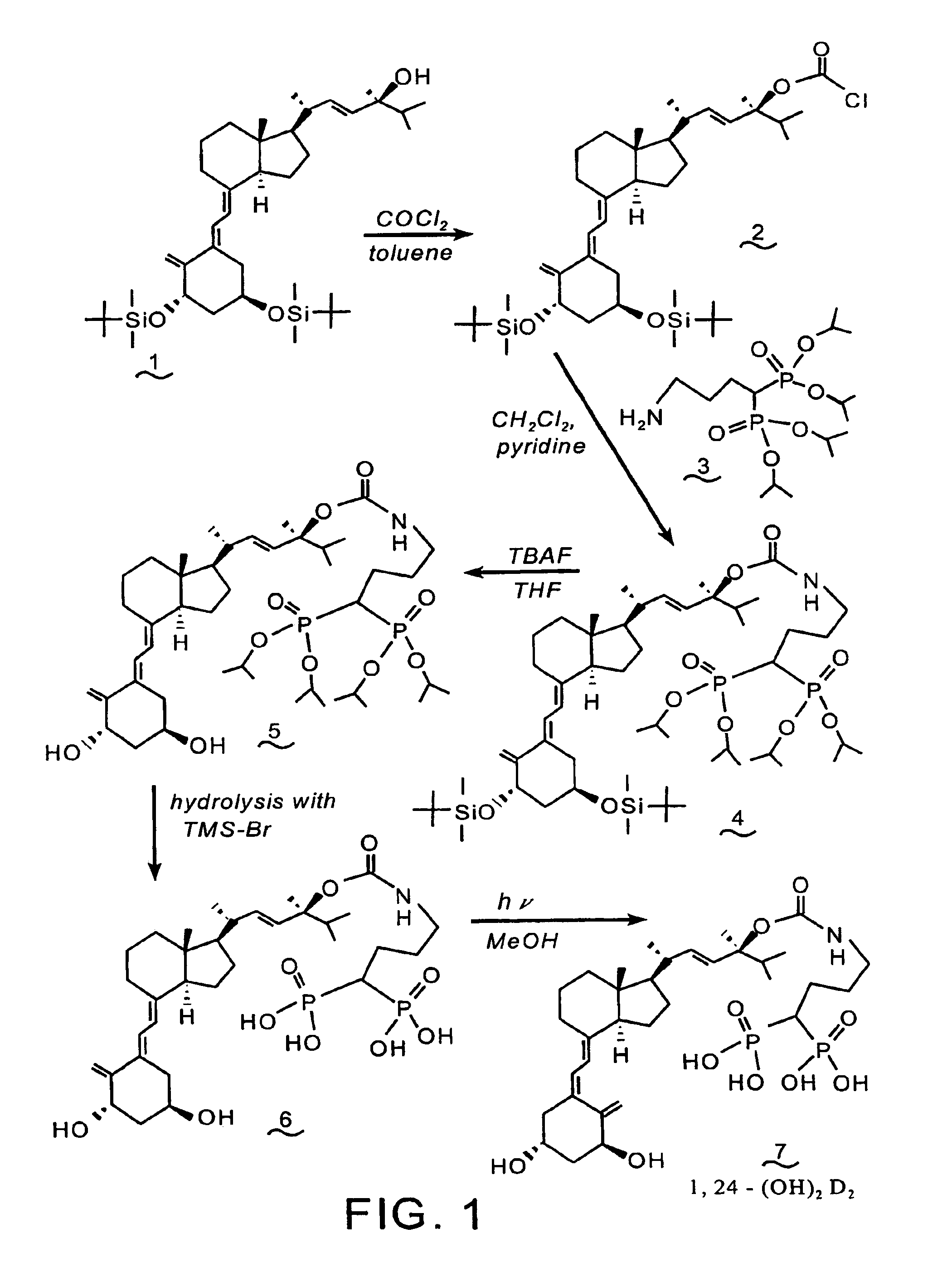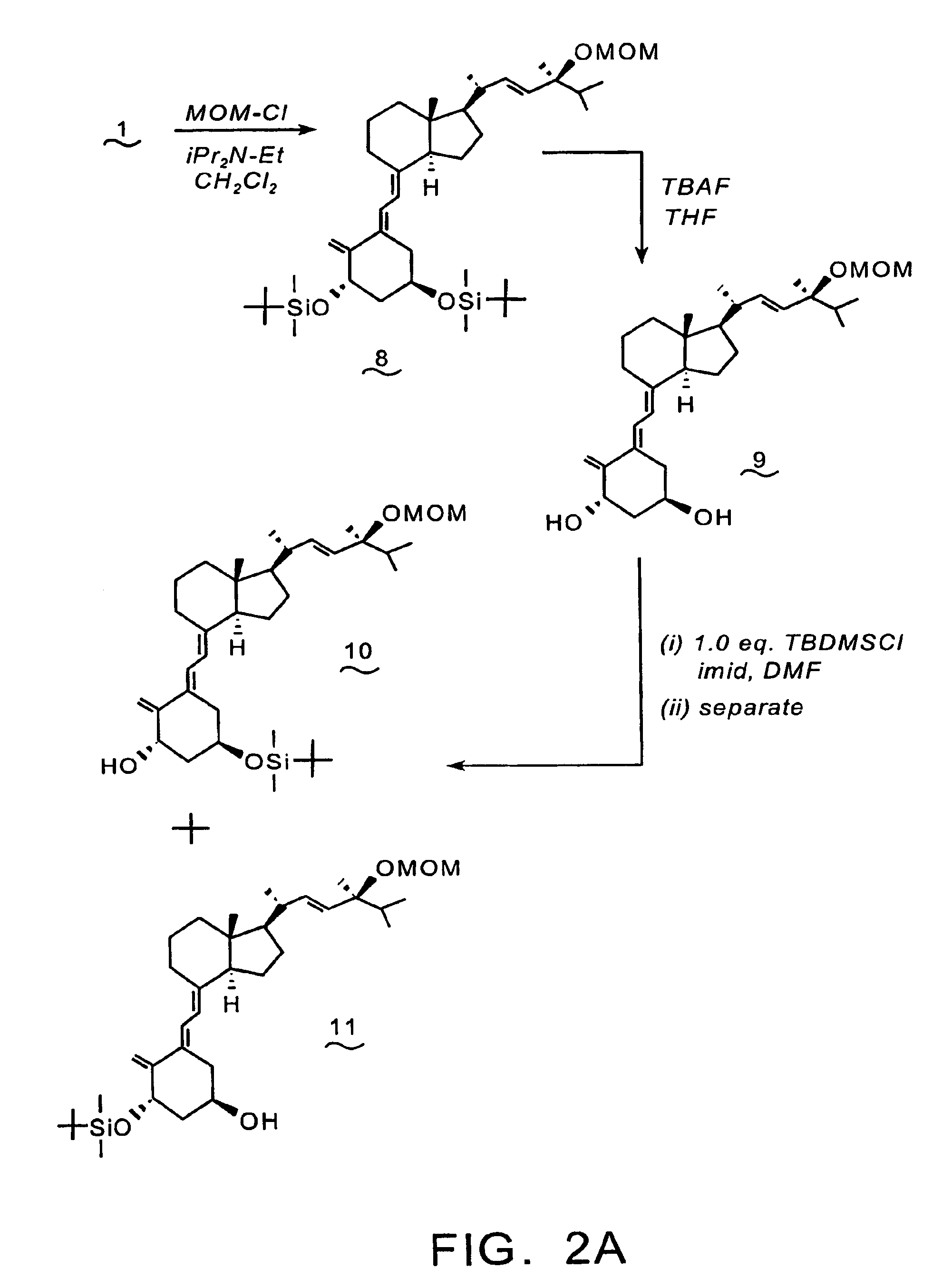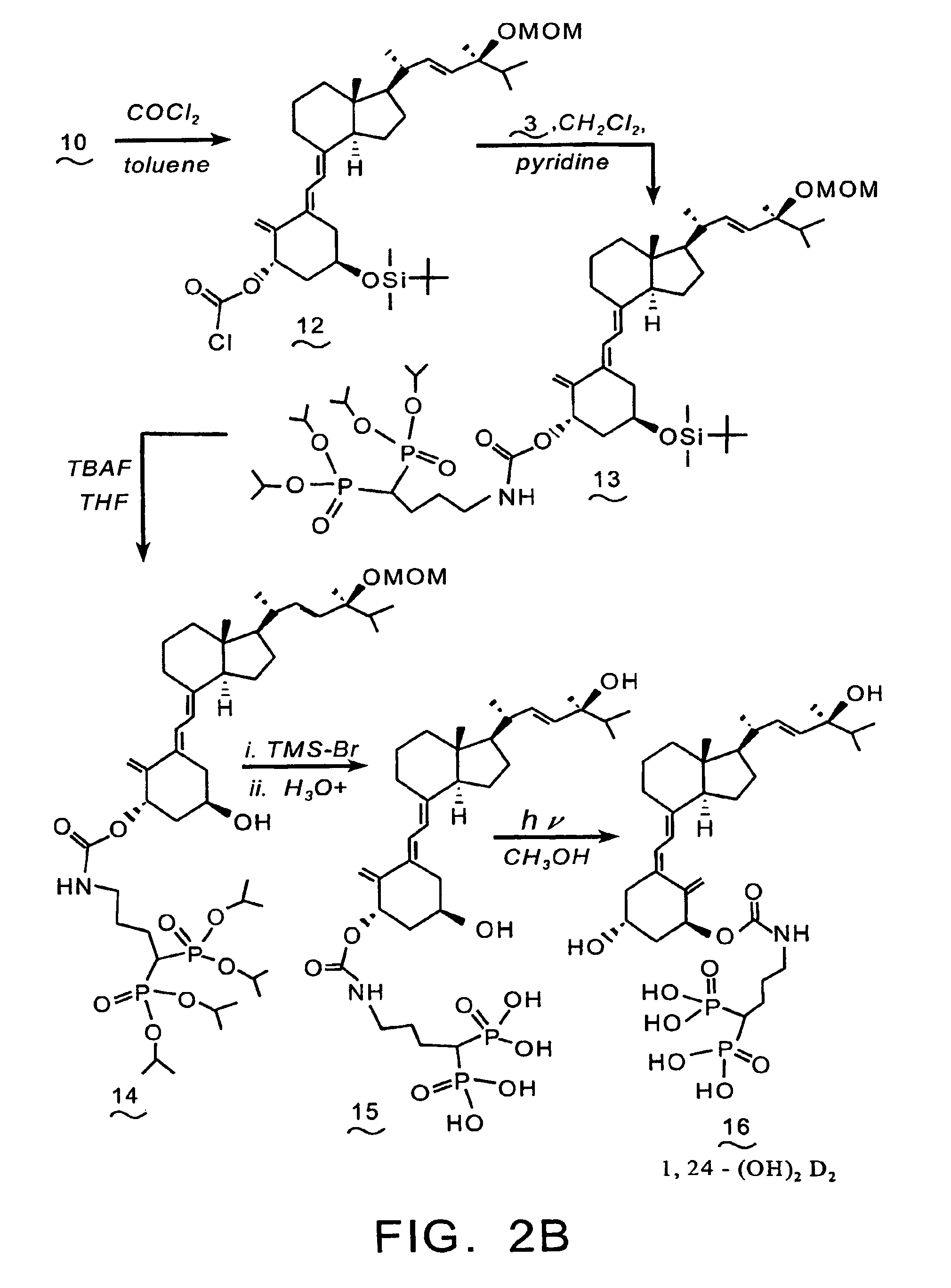Targeted therapeutic delivery of vitamin D compounds
- Summary
- Abstract
- Description
- Claims
- Application Information
AI Technical Summary
Benefits of technology
Problems solved by technology
Method used
Image
Examples
example 1
Synthesis of 1α-(OH)-24-aminoalkyl-1,1-bisphosphonate-D2 conjugate (7)
[0089]Reference is made to the reaction scheme of FIG. 1. A solution of the known alcohol (1) (1.0 g, 1.52 mmol) in toluene (5 mL) is added to 22 mL of a 12.5% solution of phosgene in toluene and the solution is stirred at room temperature for 20 hrs. The reaction mixture is concentrated under reduced pressure to provide the chloroformate (2).
[0090]Pyridine (0.18 mL, 2.2 mmol) is added to a solution of (2) (1.1 g, 1.53 mmol) and tetraisopropyl 4-aminobutyl-1,1-bisphosphonate 3 (see, Saari et al., U.S. Pat. No. 5,183,815) (0.92 g, 2.2 mmol) in CH2Cl2 (12 mL), and the mixture is stirred at room temperature for three days. The reaction mixture is concentrated under reduced pressure, and the residue is purified by flash chromatography over silica gel, utilizing methanol / chloroform as the eluent, to yield compound (4).
[0091]A solution of compound (4) (0.80 g, 0.74 mmol) in tetrahydrofuran (THF) (10 mL) and tetrabutylam...
example 2
Synthesis of 1-aminoalkyl-1,1-bisphosphonate-24-(OH)-D2 (16)
[0094]Reference is made to the reaction scheme depicted in FIGS. 2A & 2B. To a 0° C. solution of compound (1) (2.0 g, 3.04 mmol), and N,N-diisopropylethylamine (0.78 g, 6.1 mmol) in CH2Cl2 (25 mL) is added chloromethyl methyl ether (0.29 g, 3.6 mmol). The resulting reaction mixture is stirred at 0° C. for 1 hr., then at room temperature for 7 hrs, prior to dilution with water (30 mL). The separated aqueous phase is extracted with CH2Cl2 (3×25 mL), and the combined organic phases are dried over anhydrous sodium sulfate, filtered, and the filtrate is concentrated in vacuo. The residue is purified by flash chromatography over silica gel to provide compound (8).
[0095]A solution of compound (8) (1.99 g, 2.84 mmol) in THF (38 mL) and TBAF (8.4 mL of a 1.0 M THF) is stirred at room temperature for 24 hrs. The reaction mixture is diluted with water (100 mL), and extracted with CH2Cl2 (3×100 mL). The combined CH2Cl2 phases are dried...
example 3
Synthesis of 1α,24-(OH)2-3-aminoalkyl-1,1-bisphosphonate-D2 (21)
[0102]Reference is made to FIG. 3. A solution of alcohol (11) (0.5 g, 0.85 mmol) in toluene (2.5 mL) is added to 12.3 mL of a 12.5% solution of phosgene in toluene and the solution is stirred at room temperature for 20 hrs. The reaction mixture is concentrated under reduced pressure to provide chloroformate (17).
[0103]Pyridine (0.081 mL, 1 mmol) is added to a solution of (17) (0.45 g, 0.69 mmol) and tetraisopropyl 4-aminobutyl-1,1-bisphosphonate (0.41 g, 1 mmol) in CH2Cl2 (5 mL), and the mixture is stirred at room temperature for three days. The reaction mixture is concentrated under reduced pressure, and the residue is purified by flash chromatography over silica gel, utilizing methanol / chloroform as the eluent, to provide compound (18).
[0104]A solution of compound (18) (0.47 g, 0.46 mmol) in THF (6.5 mL) and TBAF (0.7 mL of a 1.0 M THF solution, 0.7 mmol) is stirred at room temperature for 24 hrs. The reaction mixture...
PUM
| Property | Measurement | Unit |
|---|---|---|
| Time | aaaaa | aaaaa |
| Composition | aaaaa | aaaaa |
Abstract
Description
Claims
Application Information
 Login to View More
Login to View More - R&D
- Intellectual Property
- Life Sciences
- Materials
- Tech Scout
- Unparalleled Data Quality
- Higher Quality Content
- 60% Fewer Hallucinations
Browse by: Latest US Patents, China's latest patents, Technical Efficacy Thesaurus, Application Domain, Technology Topic, Popular Technical Reports.
© 2025 PatSnap. All rights reserved.Legal|Privacy policy|Modern Slavery Act Transparency Statement|Sitemap|About US| Contact US: help@patsnap.com



